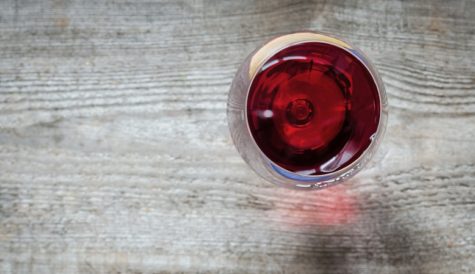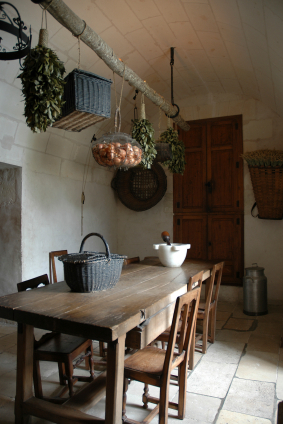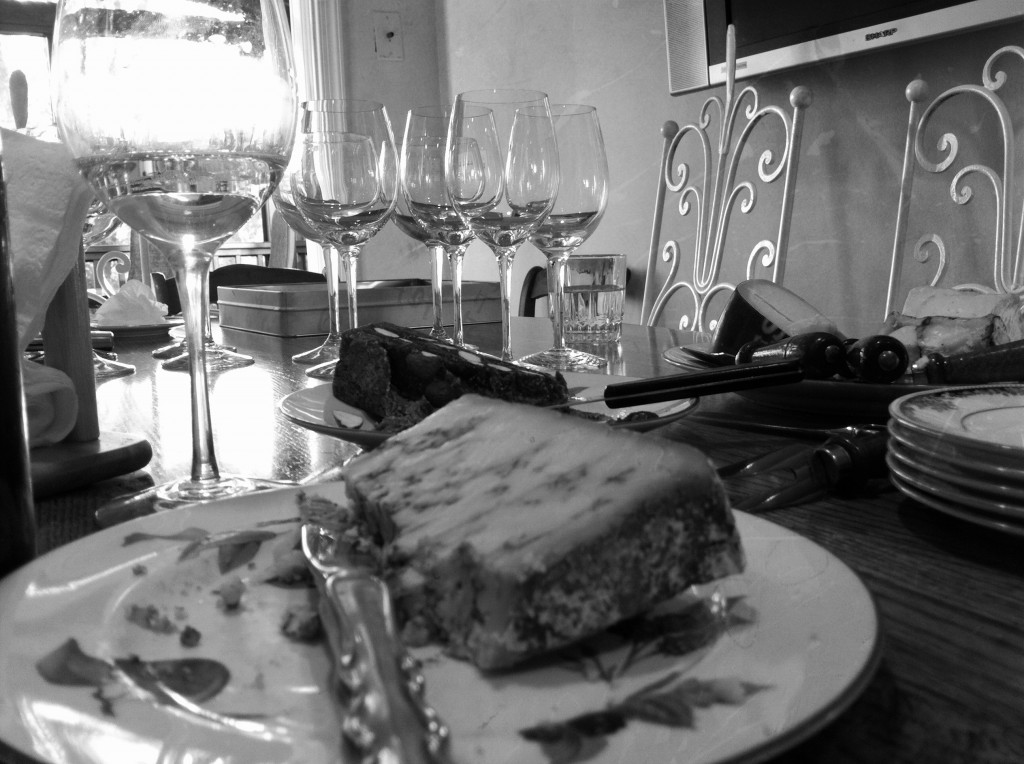I can pinpoint when it happened, when I realized that writing about the table could be a bonafide job: it was April 1984, in Boston. I was sitting alone in my suite on South Campus at Boston University, and I picked up a copy of Gourmet that someone left on the living room table. I read it from cover to cover. One article was about a young woman who had studied cooking in Paris and was spending some time in northern France. A photograph showed her dressed smartly — skinny jeans, a striped shirt, a slouchy cloth bucket hat — and standing in a field with a cow. She was nuzzling the cow; the cow was nuzzling her back. I vaguely remember the caption: The cows are very friendly in this part of France. I was mesmerized. There were a few recipes and a picture of a table laden with food — nothing fancy — and short, footed glasses of wine, of the romantic, rustic variety that a French farmhand might hoist after a morning in the field.
A few days later, one of my cousins asked me what I was planning on doing after graduation. I had been thinking about going into academia, which didn’t thrill my parents. I considered law school, which didn’t thrill my English professors. But when my cousin asked me this pointed question, it took me two seconds to answer: I wanted, I said, to write about food and wine.
My cousin was very kind, but my response baffled her. At that time, no one in my family read Gourmet. Who could possibly imagine holding down such an outlandish job (if it could be considered a job at all)? After I said it, the subject was changed, and I never brought it up again, to anyone.
It took a few years for me to nudge my way into the food world. There was a job layoff from a now-defunct publishing house, and a short spate of unemployment. There was the morning that I sat on my living room floor in my walkup apartment on East 93rd Street, with the New York Times job pages opened up, and the ad for book buyer at Dean & Deluca. I called and went down to Soho for an interview, and got the job. I started the next day. I was surrounded by books — all of the Elizabeth David volumes in imported Penguin paperbacks; M.F.K. Fisher, in the lovely, French-flapped reissued editions published by Jack Shoemaker at North Point Press; Auberge of the Flowering Hearth; Richard Olney; John Thorne; Alice Waters; Felipe Rojas Lombardi; Laurie Colwin — but also food of the most astonishing breadth and variety. Somehow (and it embarrasses me to say this: it’s such a weird word) it was discovered that I was what they horrifyingly used to call a supertaster: I would stand in the back of the store with a handful of other colleagues, taste samples that had been delivered by purveyors and producers from Tuscany to Tulum, and identify obscure ingredients in the most minute proportions. At days’ end, we would sometimes go out — sometimes to The Cupping Room, sometimes to Jerry’s or Raoul’s or Food — and talk about what we ate all day while we ate more, and drank insane, ridiculous quantities of wine until we could barely stand. This was in the late 1980s; there was also a fair amount of cocaine, which enabled everyone to stay out until three in the morning, sleep for a few hours, come back to work, and slice cold-smoked County Mayo salmon so thin that you could read the newspaper through it.
I wasn’t much for the drugs — cocaine terrified me, and like Woody Allen in Annie Hall, the last time I smoked pot I tried to take my pants off over my head — but man, the wine. I loved it, and it loved me right back. We became inseparable. My customers would ask for advice: Bandol, Beaune, or Zin? Chianti, Barbaresco, or Bordeaux? I would answer them in great detail, down to the year: ’83 was my favorite, especially for tannic Rhones, like Gigondas. I had educated myself: I actually knew what the hell I was doing because it was my job. A little while after I left the store, I found myself regularly invited to wine tasting dinners, sometimes twice a week: six courses, each place setting surrounded by a small army of Riedel glasses: Chablis, Sauternes, Gruner, Chianti, Bordeaux (Mature), Burgundy, Cognac, Water. We were all professionals to some degree and we all managed to hold it together, even though by the time the Burgundy was poured, most of us were so smashed that we couldn’t tell the difference between the seared foie gras and the lollipop lamb chops if you blindfolded us.
In my home kitchen, there was more wine: the Salice Salentinos I loved to sip while cooking for my family and friends. The cool, round Cakebread rose I’d open when the temperature climbed above sixty. The Barolos I’d pour when it snowed and everyone I knew showed up for the game birds I liked to roast and serve perched atop polenta and wild trumpet mushroom ragout. At family functions, I was the one who knew about food and wine, who could talk about Emilia Romagna and Languedoc like they were in my backyard. Wine and food made me funny and confident and smart, and pulled me out of my thick, protective shell: in my family, I went from being a dour, quiet, chronically-depressed teenager navigating the waters of my parents’ failing marriage to the bawdy, tipsy grown-up cousin pontificating about the provenance of the Alsatian muenster and dribbling her overpriced kosher Bordeaux onto the pages of her Passover Haggadah. The rituals of my life began to merge with the requirements of my profession like a Venn Diagram, and at its gray, overlapping center was excess. After years of this — the tasting events, the wee sips before/with/after dinner, the professional vodka samplings after which it was assumed I’d drive myself home, an hour away — my so-called supertaster palate was shot to hell, gone, adios, sayonara, along with my feet; that much alcohol … that much pure, unadulterated sugar … had effectively killed my supposedly nuanced tastebuds and slapped an extra twenty pounds around the center of my five foot one, sturdily-built, formerly size six frame. I looked in the mirror, and my bubbe from the old country stared back.
And this is the thing about the food world that no one ever seems to talk about: being a food professional — a writer, a chef, a caterer, a wine distributor, whatever — totally legitimizes excess, be it on the plate or in the glass or both. Comus, God of Excess, representing chaos, a wreath of flowers on his head and a torch in his hand always in the process of being dropped, is the son of Bacchus, God of Wine; it’s a very slippery slope. If you have just the tiniest smidge of a predisposition towards addiction in whatever form it comes (Instagram, Facebook, anger, Twinkies, whiskey, yoga, Blahniks) and even if you don’t, you will be fighting the worst ogre of all, and that little demon inside you — the one who promises that what you’re doing is for work, or for ritual, or for both — is going to convince you that getting stuffed and/or hammered in the name of all that is culinary on a regular basis is really okay. Because, after all, it comes with the gig. And then, as thirty-five becomes forty, and forty becomes fifty, your body will begin to break down: your blood pressure will soar, your thyroid will die, your weight will climb, your neck will sag like a child in a hammock, and your face will start to resemble a sort of pouch. Your liver will fatten up like a goose in Toulouse, and all those Bandols, Beaunes, Bordeaux, and Barolos that you swirled and savored and drank with the most perfect very French-style rosy-pink lamb or Umbrian wild boar braise will take their toll. If you’re lucky, you’ll know when to stop, or at least when to cut way back because you’ll begin to feel like you’re hauling around a sack of potatoes strapped to your ass. If you’re not lucky, you’ll have a nice come to Jesus moment right before they put the stents in, and you’ll know that food and wine are just as delicious when had in moderation. Maybe moreso. Or, in the case of the latter, maybe not at all.
I grew up in the 1970s, and back then, the d word that everyone — food and wine writers, magazine editors, health gurus — now loves to throw around meant one thing: a stay at Betty Ford or Hazelden. Today, detox has been usurped by everyone from Gwyneth Paltrow to Bon Appetit to the Pinterest food boards: we live in a binary world accepting of extremes, of feasting and fasting, where detoxing no longer means a month inpatient, but a delicate bowl of steamed green broccoli, a dollop of artisanal goat yogurt, and a sprinkling of dukkah, or a bright purple smoothie topped off with hemp seeds soaked overnight to make them more digestible, or a ten day juice fast.
So laden with the assumption of excess is the world we live in that the fact of too much is just something we take for granted, like clean air and fresh drinking water and guns. But what would happen if the food and booze community — those of us who glamorize the massive portions and the artisanalia and the out-all-nights-eating-ramen, the vintage cocktails and the whiskey parties — not only preached the moderation we love to snarkily laugh at every January when detoxing grabs the headlines, but actually practiced it? What would happen if moderation was romanticized in place of decadence? Detox is a word and a practice that is now glorified; something is seriously wrong. All of this yearning and hungering and gorging and drinking signifies a certain longing for nurturing, a need for sustenance in a world that, with every passing day, grows more and more enraged, and we, more disconnected from each other.
It’s been thirty-two years since the day I picked up Gourmet Magazine, and twenty-eight since I went to work for Dean & Deluca, did a stint in cooking school, and began to attend regular meat-a-paloozas, deep-fried vegan patty festivals, craft beer bashes, wine tours that poured four massive glasses with every course (at lunch and dinner), and whiskyfests that left me with great human interest stories, but otherwise staggering. In 2013, I was diagnosed with non-alcoholic fatty liver disease, an aortic aneurysm, hypercholesterolemia, and high blood pressure. Since then, I’ve changed the way I eat and drink; I’ve had to. And I feel better. But I still struggle to think about food and wine in smaller portions and moderate pours. Excess is what I’ve known for so many years, and, as I’ve written here, my off-switch sometimes gets stuck in the on position.
Every day is no longer a feast; it shouldn’t be. I still take pleasure in feeding the people I love, but the joy and sustenance I used to associate with decadence I now find elsewhere: in doing good work, in my garden, in my yoga classes, in art, in the company of friends and family, in the mundane, quiet life I’m lucky enough to live with Susan.
And that’s enough.








What a compelling read… I enjoy your work each and every time.
Dear Elissa, this is manna to read. Fully enjoyable, from the rosy beginning of food and eriting to the toll of excess. I comment here in cliches but you writing never does: elegant, wise, funny.
Thank you!
I was a part of the restaurant world in the late 80’s and know exactly what you’re talking about. Working behind the line all day and night, drinking and doing other bad things until dawn, crashing for a few hours and then doing it all over again, and again, and again. Wouldn’t have missed it for the world but wouldn’t want to go back there either.
With age hopefully comes a bit of wisdom and with wisdom comes the realization that moderation can be the key to so much in life.
Good luck with the new path.
Thank you
Thank you Indira ❤️
Thank you!
A beautiful confessional, Elissa, and full of wisdom for yours truly.
How does one feel joy in the context of restraint? Isn’t joy best served unbridled? Eating less has to feel less like abstinence.
“Contentment” is where you landed. I’d agree with that and that culturally, we need to start to use that as our new standard of enough.
Thank you ❤️❤️❤️
I just discovered your site through a private Facebook group for wine writers and bloggers focused on wellness. This is beautiful. As a newbie wine blogger I had to realize every glass wasn’t meant to be drunk and every meal not meant to be finished. It’s hard, but for me to take care of myself I had to let go. I found once I went back to my yoga practice I was able to discover the excess and focus on using yoga off the mat to guide me. This truly spoke to me.
That’s so lovely Julia. Thanks so much. 🙏🏻🙏🏻🙏🏻
Every time I see an overweight chef I wonder what his or her A1C is.
I wish there were more sanity around this. Everyone is either hawking excess or the cure du Jour to recover from it. Simplicity or enjoyment of healthier portions is seen mostly as penance. There can be so much joy if we give up that false Puritan dichotomy.
I made something tonight with ten Serrano chiles. The recipe called for 20. More is not always better.
Well said and well done. Glad to be along for the the ride.
“What you’re doing is for work…” is the rationalization I use every day. Two years into my job and twenty pounds later, it hasn’t served me well. Great piece, thank you!
Have you been hiding in my wardrobe for years? Sometimes my wine excess button goes into overdrive and now, having hit 50, I have to remind myself that I’m not immortal and I’d quite like to be around to see the grandchildren grow up! I do a lot of food reviews for the magazine I work for and have learned that less is definitely more! Thanks for this – I am not alone…
Hi Elissa,
I began reading this post in my usual procrastination of engaging in some level of morning fitness while questioning/damning how on Earth I now live in this bloated and so easily fatigued body of mine. Why do we feel the need to eat/drink to excess when it is so physically unnatural + unhealthy for us as humans to do so?!
The mention of cold smoked Mayo salmon, brought a smile to my lips,
but then you dove straight into reality with a notion I have been quietly and strongly considering for some time…the mad idea that detoxing has become the new normal which is completely bonkers.
I don’t know what else to say, but thank you for bravely putting this out into the universe, that you are not alone, and that I am not alone!!
Raising a cup of chamomile tea to living a straight full life in moderation, if you can let me know when you have it figured out, I’d be grateful xx
Please take out “straight” in last sentence – it was meant for above paragraph – bloody iPhone!!
As a one-time chef I often go to high schools and speak to starry eyed teenagers about the “unglamorous” parts of being a chef – the ridiculous working hours, the drugs and drinking, the high divorce rate, the rampant misogyny (at least back in the 70s & 80s), and tragically in some cases suicide. Don’t get me wrong, I love food and the food world and there are many wonderful aspects to it, but it has a dark side which is often ignored or unknown; especially to guidance counselors and teens who dream of opening a restaurant one day. Bravo Elissa for telling the truth!
I joke that some people gain the freshman-15, but that I gained the blog-50 when I started my food blog. 7 years in and closer to the blog-60, and finally 30 pounds lost, I have a way to go, but in this industry it’s so hard to moderate. Thanks for addressing this so beautifully! xo, gayle
The passion was food also, 450 lbs by 2009. Bariatric surgery also in 2009, now 172. My passion is still food and smaller portions are easy and my only option. I also enjoy a good cocktail. Very happy in Hyde Park, I’ve readed your books and try to keep up with your blog,
A compelling read. I’m sure it resonates with everyone who loves food and eating, as I do. I too found exercise, and portion control, just in time. I was a follower of yours anyway, but this has cemented our ‘relationship ‘ . Many thanks.
Hi David!
Thanks so much Sally –
Elissa, I think you’ve just found a new feast, one that nurtures all of you in a fuller way, feeds your heart, mind, and soul. Thank you for the beautiful words, as always. xo-Jennie
So happy for you in your arriving at this point in your journey! One thing that especially leaped out to me that you list “in my garden” as the second place of “joy and sustenance” following “good work”–gardening is a passionate interest of mine. Would love to hear some more about your garden. Your writing touches my heart. The photographs in this post are also very special. Thank you.
Beautifully written! Thank you so much for sharing your story and for being so articulate and honest about it. This business we are in: it is a slippery slope. I am grateful that in these troubled times i can leave the samples of whiskey and tequila in their boxes, and be strategic about the wine. But I do see the skewed existence when I think nothing of opening another bottle when the first didn’t pair the way I wanted it to. And the wine dinners and then driving home 60 miles? At least at night there’s not much traffic. And I find it harder and harder to get off the couch to garden and yoga and exercise these 20 extra, oops now 40 extra pounds that have crept up on me during the past 10 years of wine and food writing. It’s time to get some weeding done! Cheers!
I can relate. At a food and wine festival several years ago, a colleague of mine introduced me to a friend who’d dropped a lot of weight after a diagnosis of gout. I worked the circuit of tradeshows and food shows seeing people passionate about food and drink and wondering when the passion turned the corner into dangerous territory of health risks from which you can’t recuperate. At one point, I truly thought I needed to work myself out of the food world because I could see where this path led for me and it would be a shortened existence. And, I’ve mostly made my peace with it. But, I also think I will always wrestle with the too muchness of a food-oriented life (especially when developing a cookie recipe where 5 batches have to be tested). Instead, a friend of mine’s mantra has become my own: “Make one healthy decision. Then make another.” It’s a path rather than an attaining of perfection.
Elissa,
Thank you for writing this. It’s something I think about and struggle with a lot. I feel like I’m behind if I eat healthy a few days a week living in NYC as a restaurant worker and food writer. I should be eating and drinking the new food at work. I should be trying that new restaurant/pop-up/beer bar. Plus, people engage more on my Instagram when it’s a burger, pizza, ice cream or a donut. Scaling back is never a bad thing, but talking about it is the first step.
“All of this yearning and hungering and gorging and drinking signifies a certain longing for nurturing, a need for sustenance in a world that, with every passing day, grows more and more enraged, and we, more disconnected from each other.”
Your entire post is inspiring. The above quote is especially meaningful, I think.
Thanks so very much. 🙏🏻
I am very, very late to this whole party. Elissa, I don’t know how I have never read your blog before (or your books! or your articles!), but I came across your Epicurious piece about Laurie Colwin today and followed the resulting avalanche of internet breadcrumbs to all of your work. I wrestle with this question so much — how to live when the living of one’s best life is represented in so many contradicting ways on social and traditional media. It’s taken me 34 years to even acknowledge this struggle, and I feel I’m still years away from resolving it for myself. This post left me feeling nurtured and heard and seen, and I’m so glad to know you’re out there. Thank you.
Many thank Jeanelle—and I’m so delighted you followed the breadcrumbs……
I can so relate to this. Thank you for helping me feel connected. Love your writings.
I just so enjoy your writing. I’ve been reading old posts for the past hour. It’s so much fun! Thank you! Wish I had been in your loop before now…I, too, worked in the restaurant industry during the 70s and 80s in the village, nyc.
I do so appreciate your brilliant articles. Gonna go read more……
Thank you so much!
{ 2 trackbacks }